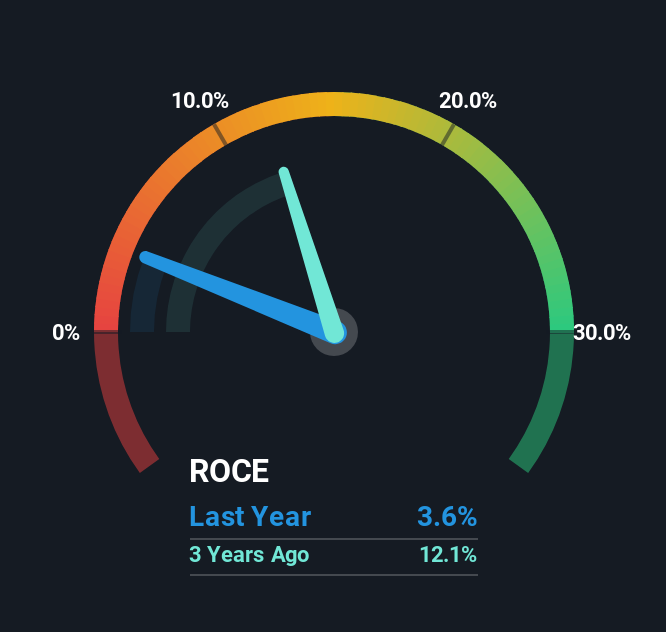- India
- /
- Auto Components
- /
- NSEI:SHIVAMAUTO
Returns Are Gaining Momentum At Shivam Autotech (NSE:SHIVAMAUTO)
What trends should we look for it we want to identify stocks that can multiply in value over the long term? One common approach is to try and find a company with returns on capital employed (ROCE) that are increasing, in conjunction with a growing amount of capital employed. Put simply, these types of businesses are compounding machines, meaning they are continually reinvesting their earnings at ever-higher rates of return. So when we looked at Shivam Autotech (NSE:SHIVAMAUTO) and its trend of ROCE, we really liked what we saw.
Return On Capital Employed (ROCE): What Is It?
Just to clarify if you're unsure, ROCE is a metric for evaluating how much pre-tax income (in percentage terms) a company earns on the capital invested in its business. Analysts use this formula to calculate it for Shivam Autotech:
Return on Capital Employed = Earnings Before Interest and Tax (EBIT) ÷ (Total Assets - Current Liabilities)
0.036 = ₹61m ÷ (₹5.2b - ₹3.5b) (Based on the trailing twelve months to June 2025).
Thus, Shivam Autotech has an ROCE of 3.6%. Ultimately, that's a low return and it under-performs the Auto Components industry average of 13%.
See our latest analysis for Shivam Autotech

While the past is not representative of the future, it can be helpful to know how a company has performed historically, which is why we have this chart above. If you'd like to look at how Shivam Autotech has performed in the past in other metrics, you can view this free graph of Shivam Autotech's past earnings, revenue and cash flow.
So How Is Shivam Autotech's ROCE Trending?
It's great to see that Shivam Autotech has started to generate some pre-tax earnings from prior investments. While the business is profitable now, it used to be incurring losses on invested capital five years ago. At first glance, it seems the business is getting more proficient at generating returns, because over the same period, the amount of capital employed has reduced by 52%. This could potentially mean that the company is selling some of its assets.
On a side note, we noticed that the improvement in ROCE appears to be partly fueled by an increase in current liabilities. Essentially the business now has suppliers or short-term creditors funding about 67% of its operations, which isn't ideal. And with current liabilities at those levels, that's pretty high.
The Bottom Line On Shivam Autotech's ROCE
In a nutshell, we're pleased to see that Shivam Autotech has been able to generate higher returns from less capital. And investors seem to expect more of this going forward, since the stock has rewarded shareholders with a 85% return over the last five years. Therefore, we think it would be worth your time to check if these trends are going to continue.
Shivam Autotech does have some risks, we noticed 2 warning signs (and 1 which is potentially serious) we think you should know about.
While Shivam Autotech may not currently earn the highest returns, we've compiled a list of companies that currently earn more than 25% return on equity. Check out this free list here.
New: Manage All Your Stock Portfolios in One Place
We've created the ultimate portfolio companion for stock investors, and it's free.
• Connect an unlimited number of Portfolios and see your total in one currency
• Be alerted to new Warning Signs or Risks via email or mobile
• Track the Fair Value of your stocks
Have feedback on this article? Concerned about the content? Get in touch with us directly. Alternatively, email editorial-team (at) simplywallst.com.
This article by Simply Wall St is general in nature. We provide commentary based on historical data and analyst forecasts only using an unbiased methodology and our articles are not intended to be financial advice. It does not constitute a recommendation to buy or sell any stock, and does not take account of your objectives, or your financial situation. We aim to bring you long-term focused analysis driven by fundamental data. Note that our analysis may not factor in the latest price-sensitive company announcements or qualitative material. Simply Wall St has no position in any stocks mentioned.
About NSEI:SHIVAMAUTO
Shivam Autotech
Engages in the manufacture and sale of auto transmission components for original equipment manufacturers in India and internationally.
Mediocre balance sheet and slightly overvalued.
Market Insights
Weekly Picks

Solutions by stc: 34% Upside in Saudi's Digital Transformation Leader


The AI Infrastructure Giant Grows Into Its Valuation
Recently Updated Narratives

Perdana Petroleum Berhad is a Zombie Business with a 27.34% Profit Margin and inflation adjusted revenue Business
Many trends acting at the same time


Engineered for Stability. Positioned for Growth.
Popular Narratives


MicroVision will explode future revenue by 380.37% with a vision towards success


NVDA: Expanding AI Demand Will Drive Major Data Center Investments Through 2026



